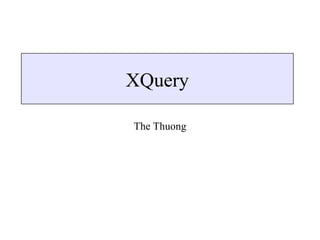
X Query for beginner
- 2. In this lecture • Summary of XQuery • Default data type mapping( http://en.wikipedia.org/wiki/XQuery_API_for_Java) • FLWOR expressions • FOR and LET expressions • Collections and sorting Resources W3C recommendation: www.w3.org/TR/xquery/ Google
- 3. XQuery • Based on XPath • http://www.w3.org/TR/xquery/ XQuery 2.0
- 4. FLWR Expressions What does FLWR stand for F - for L - let W - where R - return
- 5. XQuery Find all book titles published after 1995: FOR $x IN doc ("books")/bib/book WHERE $x/year > 1995 RETURN $x/title FOR $x IN doc ("books")/bib/book WHERE $x/year > 1995 RETURN $x/title Result: <title> abc </title> <title> def </title> <title> ghi </title>
- 6. XQuery For each author of a book by Morgan Kaufmann, list all books she published: FOR $a IN distinct-values(doc ("books.xml") /bib/book[publisher=“Morgan Kaufmann”]/author) RETURN <result> $a, FOR $t IN /bib/book[author=$a]/title RETURN $t </result> FOR $a IN distinct-values(doc ("books.xml") /bib/book[publisher=“Morgan Kaufmann”]/author) RETURN <result> $a, FOR $t IN /bib/book[author=$a]/title RETURN $t </result> distinct = a function that eliminates duplicates
- 7. XQuery Result: <result> <author>Jones</author> <title> abc </title> <title> def </title> </result> <result> <author> Smith </author> <title> ghi </title> </result>
- 8. XQuery • FOR $x in expr -- binds $x to each element in the list expr • LET $x = expr -- binds $x to the entire list expr – Useful for common subexpressions and for aggregations
- 9. XQuery count = a (aggregate) function that returns the number of elms <big_publishers> FOR $p IN distinct-values(doc ("books.xml")//publisher) LET $b := doc ("books.xml")/book[publisher = $p] WHERE count($b) > 100 RETURN $p </big_publishers> <big_publishers> FOR $p IN distinct-values(doc ("books.xml")//publisher) LET $b := doc ("books.xml")/book[publisher = $p] WHERE count($b) > 100 RETURN $p </big_publishers>
- 10. XQuery Find books whose price is larger than average: LET $a=avg(doc(“books.xml")/bib/book/@price) FOR $b in doc("books.xml")/bib/book WHERE $b/@price > $a RETURN $b LET $a=avg(doc(“books.xml")/bib/book/@price) FOR $b in doc("books.xml")/bib/book WHERE $b/@price > $a RETURN $b
- 11. XQuery Summary: • FOR-LET-WHERE-RETURN = FLWR FOR/LET Clauses WHERE Clause RETURN Clause List of tuples List of tuples Instance of Xquery data model
- 12. FOR v.s. LET FOR • Binds node variables iteration LET • Binds collection variables one value
- 13. FOR v.s. LET FOR $x IN doc ("books.xml")/bib/book RETURN <result> $x </result> FOR $x IN doc ("books.xml")/bib/book RETURN <result> $x </result> Returns: <result> <book>...</book></result> <result> <book>...</book></result> <result> <book>...</book></result> ... LET $x := doc ("books.xml")/bib/book RETURN <result> $x </result> LET $x := doc ("books.xml")/bib/book RETURN <result> $x </result> Returns: <result> <book>...</book> <book>...</book> <book>...</book> ... </result>
- 14. Collections in XQuery • Ordered and unordered collections – /bib/book/author = an ordered collection – Distinct-values(/bib/book/author) = an unordered collection • LET $a = /bib/book $a is a collection • $b/author a collection (several authors...) RETURN <result> $b/author </result>RETURN <result> $b/author </result> Returns: <result> <author>...</author> <author>...</author> <author>...</author> ... </result>
- 15. Collections in XQuery What about collections in expressions ? • $b/@price list of n prices • $b/@price * 0.7 list of n numbers • $b/@price * $b/@quantity list of n x m numbers ?? • $b/@price * ($b/@quant1 + $b/@quant2) ≠ $b/@price * $b/@quant1 + $b/@price * $b/@quant2 !!
- 16. Sorting in XQuery <publisher_list> FOR $p IN distinct-values(doc("books.xml")//publisher) RETURN <publisher> <name> $p/text() </name> , FOR $b IN doc("books.xml")//book[publisher = $p] RETURN <book> $b/title , $b/@price </book> SORTBY(price DESCENDING) </publisher> SORTBY(name) </publisher_list> <publisher_list> FOR $p IN distinct-values(doc("books.xml")//publisher) RETURN <publisher> <name> $p/text() </name> , FOR $b IN doc("books.xml")//book[publisher = $p] RETURN <book> $b/title , $b/@price </book> SORTBY(price DESCENDING) </publisher> SORTBY(name) </publisher_list>
- 17. Sorting in XQuery • Sorting arguments: refer to the name space of the RETURN clause, not the FOR clause • To sort on an element you don’t want to display, first return it, then remove it with an additional query.
- 18. If-Then-Else FOR $h IN //holding RETURN <holding> $h/title, IF $h/@type = "Journal" THEN $h/editor ELSE $h/author </holding> SORTBY (title) FOR $h IN //holding RETURN <holding> $h/title, IF $h/@type = "Journal" THEN $h/editor ELSE $h/author </holding> SORTBY (title)
- 19. Other Stuff in XQuery • BEFORE and AFTER – for dealing with order in the input • FILTER – deletes some edges in the result tree • Recursive functions – Currently: arbitrary recursion – Perhaps more restrictions in the future ?
- 20. Group-By in Xquery ?? • No GROUPBY currently in XQuery • A recent proposal (next) – What do YOU think ?
- 21. Group-By in Xquery ?? FOR $b IN doc ("http://www.bn.com")/bib/book, $y IN $b/@year WHERE $b/publisher="Morgan Kaufmann" RETURN GROUPBY $y WHERE count($b) > 10 IN <year> $y </year> FOR $b IN doc ("http://www.bn.com")/bib/book, $y IN $b/@year WHERE $b/publisher="Morgan Kaufmann" RETURN GROUPBY $y WHERE count($b) > 10 IN <year> $y </year> SELECT year FROM Bib WHERE Bib.publisher="Morgan Kaufmann" GROUPBY year HAVING count(*) > 10 SELECT year FROM Bib WHERE Bib.publisher="Morgan Kaufmann" GROUPBY year HAVING count(*) > 10 with GROUPBY Equivalent SQL
- 22. Group-By in Xquery ?? FOR $b IN doc("http://www.bn.com")/bib/book, $a IN $b/author, $y IN $b/@year RETURN GROUPBY $a, $y IN <result> $a, <year> $y </year>, <total> count($b) </total> </result> FOR $b IN doc("http://www.bn.com")/bib/book, $a IN $b/author, $y IN $b/@year RETURN GROUPBY $a, $y IN <result> $a, <year> $y </year>, <total> count($b) </total> </result> FOR $Tup IN distinct-values(FOR $b IN doc("http://www.bn.com")/bib, $a IN $b/author, $y IN $b/@year RETURN <Tup> <a> $a </a> <y> $y </y> </Tup>), $a IN $Tup/a/node(), $y IN $Tup/y/node() LET $b = doc("http://www.bn.com")/bib/book[author=$a,@year=$y] RETURN <result> $a, <year> $y </year>, <total> count($b) </total> </result> FOR $Tup IN distinct-values(FOR $b IN doc("http://www.bn.com")/bib, $a IN $b/author, $y IN $b/@year RETURN <Tup> <a> $a </a> <y> $y </y> </Tup>), $a IN $Tup/a/node(), $y IN $Tup/y/node() LET $b = doc("http://www.bn.com")/bib/book[author=$a,@year=$y] RETURN <result> $a, <year> $y </year>, <total> count($b) </total> </result> with GROUPBY Without GROUPBY
- 23. Group-By in Xquery ?? FOR $b IN doc("http://www.bn.com")/bib/book, $a IN $b/author, $y IN $b/@year, $t IN $b/title, $p IN $b/publisher RETURN GROUPBY $p, $y IN <result> $p, <year> $y </year>, GROUPBY $a IN <authorEntry> $a, GROUPBY $t IN $t <authorEntry> </result> Nested GROUPBY’s
